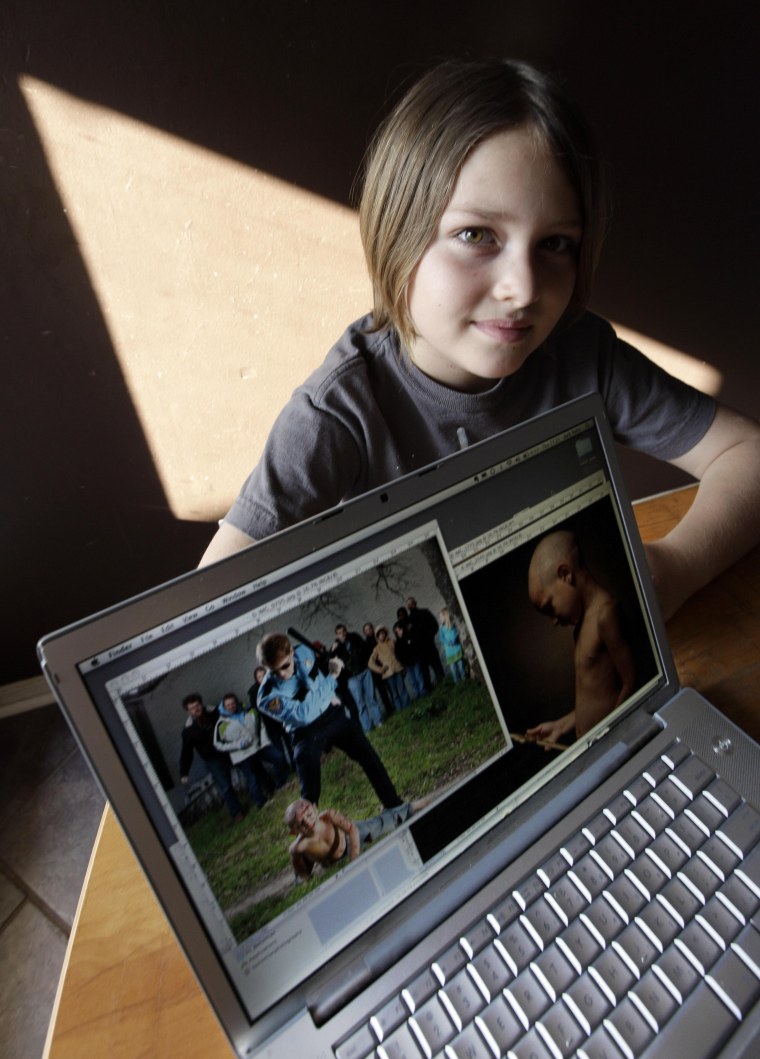Some find Jackson Potts II's photograph of a nightstick-wielding policeman beating a fallen, bleeding child violent and offensive, conjuring images of police brutality and child abuse.
But to Jackson, a talented 10-year-old Houston photographer, and a cadre of art lovers, the disturbing image has religious symbolism.
Jackson shot the photograph for an exhibit depicting the Stations of the Cross, but the show's organizers rejected it, sparking a controversy some say is overshadowing remembrance of Jesus' final hours during the season of Lent.
Jackson was the only child among 15 artists invited to participate in the exhibit. Curator Marc Brubaker said he thought the boy would bring a unique perspective.
But comments posted anonymously on blogs and callers to radio talk shows have questioned whether such a sophisticated piece could really be the work of a child.
Jackson was assigned to portray the seventh Station of the Cross, where Jesus fell for a second time while carrying the cross to the site of his crucifixion. The home-schooled fifth-grader, who is taking a class on religious symbols in art at a Catholic church, decided to do a modern depiction of Christ being beaten by a Roman soldier.
"I thought about how innocent Jesus was, like a kid," Jackson said. "I thought a police officer was sort of like a Roman guard."
His younger brother played the Christ-child role, with stage blood splattered on his head and arms. Neighbors and friends portrayed an angry mob and brutal police officer.
Carefully crafted picture
Although Jackson has gone on more than a 100 photo shoots in recent years, mainly working as an apprentice for his father, a professional photographer, the show at Xnihilo (NY'-low) Gallery was to be his first public exhibition.
He worked for months to get the details right, taking advice on everything from makeup to lighting. But the concept and execution were his own, he and those who know him say.
Jeremy Martin-Weber, who was part of the angry crowd, said Jackson held the camera during the entire photo shoot.
"Jackson told us where to go, how to stand and every once in a while, Jack (his dad) would ask a general preference question, 'Do you want them in a row or a little bit curved?' Jackson would make the call," Martin-Weber said. "Jackson was in charge of the whole thing."
But when Jackson submitted the finished piece, he was told it wouldn't be shown.
The fine arts gallery also serves as the sanctuary for the 1,100-member Ecclesia Church, and "a church should be a place where people can feel safe," Brubaker said.
Provocative in 'wrong way'
Church elders said they thought the photograph would scare young children who trust and respect police officers, some of whom are also church members. Elders said they also wanted to be sensitive to a congregation member whose mentally impaired son was fatally shot by police around this time last year.
"Certainly we don't want to be censoring art or anything like that," said Jeremy Wells, a gallery board member, church elder and artist. "Artwork being provocative in nature can be beneficial to the church if it's provocative in the right way.
"We felt it was provocative in the wrong way," Wells said. "The image, being as graphic as it is, did not draw people closer to the risen Christ."
He praised Jackson's "phenomenal talent," saying the rejection wasn't made lightly. The church paid the boy about $250 for the loss of material and time and asked him to create and submit a replacement photograph in the two weeks before the show opened, which he reluctantly did.
Jackson's father recalled the boy's frustration.
"I could tell that he's on the verge of tears," Jack Potts said. "I give him a hug. He tells me he can't make Jesus smiling, because he feels like that's what they want."
Simple second photograph
Jackson kept his second photograph simple, showing Jesus, still as a child, holding the cross in his hands.
Suggestions by some gallery board members to have the original photograph behind a curtain where only adults could see it were rebuffed.
Two of the gallery's seven board members resigned in protest.
One of them, Jessica Martin-Weber, said she felt Jackson's photograph was appropriate for the exhibit and parents should decide whether their children could see it. A three-dimensional piece that hung in the show last year, a mannequin "corpse" draped in a blood-soaked cloth, was just as shocking, she said.
Elders eventually allowed Jackson's original piece to be shown but only during the opening reception last week.
To the boy's delight, a stranger bought it for $350, and a copy is now hanging in another Houston gallery.
"I'm not a big religious freak," G Gallery owner Wayne Gilbert said. "The idea that he couldn't show that or it was something that couldn't go on the wall was sort of ridiculous to me."
